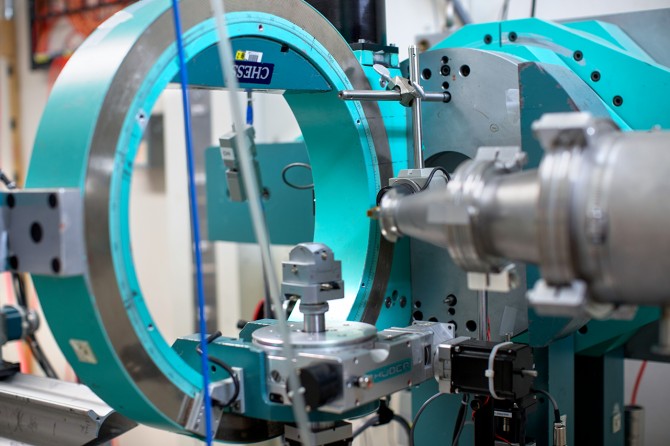
Rice plants are photographed in the X-ray beamline at the Cornell High Energy Synchrotron Source.
CHESS to restart in June for COVID-19 research
By Susan Newman
The Cornell High Energy Synchrotron Source (CHESS) will partially restart operations in June to conduct research related to treatment of SARS-CoV-2, the virus that causes COVID-19.
Funded by the National Institutes of Health, the research – to be led by Richard Cerione, the Goldwin Smith Professor of Chemistry and Chemical Biology in the College of Arts and Sciences, and Goldwin Smith Professor of Pharmacology and Chemical Biology in the College of Veterinary Medicine – focuses on cancer-fighting enzyme blockers, which have potential as SARS-CoV-2 inhibitors.
The experiments will take place at the X-ray crystallography beamline of CHESS – funded by the National Science Foundation, the NIH and Empire State Development’s Division of Science, Technology and Innovation (NYSTAR) – to determine the structures of drug-enzyme complexes, which will help to inform drug potency, dosages and reliability.
On May 1, Cornell granted CHESS permission to restart the synchrotron after the facility was shut down quickly in mid-March due to the coronavirus pandemic. The Cornell Electron Storage Ring (CESR) must be carefully restarted in order to conduct the X-ray crystallography experiment; restart is expected to happen in early June.
Joel Brock, director of CHESS, said safety will be a top priority.
“We are practicing strict distancing protocols and other measures,” he said. “It will definitely take us longer [than usual] to prepare for the experiment, but being able to restart the machine in order to research a potential drug for COVID-19 is extremely exciting.”
Cerione’s lab studies a family of enzymes that plays an essential role in the metabolism of cancer cells – and, as it turns out, viruses such as SARS-CoV-2.
“These enzymes are necessary for the altered metabolism of cancer cells, which the tumor cells critically need much, much more than normal cells,” Cerione said. “We have been developing inhibitors that block these enzymes as anti-cancer drugs. It turns out viruses need the same enzymes for their infection, replication and transmission.”
A particularly useful feature of this particular beamline at CHESS is that X-ray crystallography can be done at room temperature, which will reveal structural differences in the complexes Cerione is studying. They look identical in cryogenic X-ray crystallographic imaging, he said.
According to Mike Forster, CESR’s director of operations, this restart will be slower than usual.Typically, teams of specialists – from cryogenics and electrical systems to radiation safety and vacuum – work hand-in-hand to ensure a safe start-up. Now, crews need to carefully schedule their activity while also maintaining six-foot distancing.
“CESR is fortunate to have a very talented, dedicated and meticulous technical staff,” Forster said. “We will be working remotely as much as possible and working with our outstanding safety team to make sure any entrance to the lab meets and exceeds strict health guidelines.”
Cerione said no live or infectious cultures of COVID-19 will be involved in his research. He also said the results his team can achieve at MacCHESS will help scientists prepare for infectious diseases experts think may be just over the horizon.
“We need better structural pictures for our enzyme-drug complexes so as to design more potent drug candidates in anticipation of the next wave of viral infections,” Cerione said. “We are betting that, at room temperature, we will be able to obtain crystal structures that much better distinguish between our drug samples and will help us, and others, do better rational drug design in the future.”
CHESS, which attracts more than 1,000 users annually, receives major funding from the National Science Foundation for the Center for High Energy X-ray Sciences (CHEXS) at CHESS, NIH and New York state as well as the Air Force Research Lab for the Materials Solution Network at CHESS (MSN-C).
Susan Newman is a science communicator for the Cornell Laboratory for Accelerator-based Sciences and Education.
Media Contact
Get Cornell news delivered right to your inbox.
Subscribe

